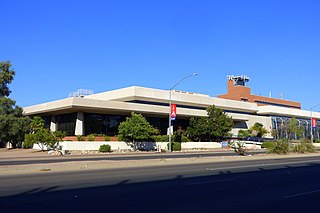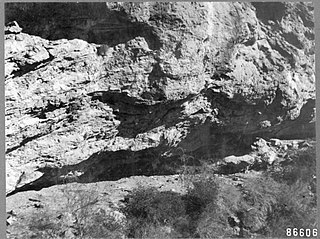Related Research Articles

The Yaqui,Hiaki,or Yoeme,are an Indigenous people of Mexico and Native American tribe,who speak the Yaqui language,a Uto-Aztecan language.
Indigenous peoples of Arizona are the Native American people who currently live or have historically lived in what is now the state of Arizona. There are 22 federally recognized tribes in Arizona,including 17 with reservations that lie entirely within its borders. Reservations make up over a quarter of the state's land area. Arizona has the third largest Native American population of any U.S. state.

The Yavapai–Apache Nation is a federally recognized Native American tribe of Yavapai people in the Verde Valley of Arizona. Tribal members share two culturally distinct backgrounds and speak two Indigenous languages,the Yavapai language and the Western Apache language.

University of Arizona James E. Rogers College of Law,also known as the University of Arizona College of Law,is the law school at the University of Arizona located in Tucson,Arizona,United States and was the first law school founded in the State of Arizona,opening its doors in 1915. It was renamed in 1999 in honor of broadcasting executive James E. Rogers,a 1962 graduate of the school,and chairman of Sunbelt Communications Company based in Las Vegas,Nevada.

The Pascua Yaqui Tribe of Arizona is a federally recognized tribe of Yaqui Native Americans in the state of Arizona.

The Sandra Day O'Connor College of Law is the law school at Arizona State University in Phoenix,Arizona. The school is located in the Beus Center for Law and Society on ASU's downtown Phoenix campus. Created in 1965 as the Arizona State University College of Law upon recommendation of the Arizona Board of Regents,with the first classes held in the fall of 1967. The school has held American Bar Association accreditation since 1969 and is a member of the Order of the Coif. The school is also a member of the Association of American Law Schools. In 2006,the law school was renamed in honor of Phoenix resident,Stanford graduate,and retired Supreme Court Justice Sandra Day O'Connor.
Stacy L. Leeds is an American law professor,scholar,and former Supreme Court Justice for the Cherokee Nation. She served as Dean of the University of Arkansas School of Law,from 2011-2018,the first Indigenous woman to lead a law school. She was a candidate for Principal Chief of the Cherokee Nation in 2007. In 2024,she was elected to the American Philosophical Society.

The Yavapai are a Native American tribe in Arizona. Their Yavapai language belongs to the Upland Yuman branch of the proposed Hokan language family.

Diane Joyce Humetewa is a United States district judge of the United States District Court for the District of Arizona. Humetewa is the first Native American woman and the first enrolled tribal member to serve as a U.S. federal judge. She previously served as the United States Attorney for the District of Arizona from 2007 to 2009. Humetewa is also a Professor of Practice at Arizona State University's Sandra Day O'Connor College of Law.
Robert A. Williams Jr. is an American lawyer,author,and legal scholar. He works in the fields of federal Indian law,international law,indigenous peoples' rights,critical race and post-colonial theory. Williams teaches at the University of Arizona's James E. Rogers College of Law,serving as Regents Professor,E. Thomas Sullivan Professor of Law and Faculty Chair of the Indigenous Peoples Law and Policy Program.
The James E. Rogers College of Law at the University of Arizona has created an academic center for the study of American Indian and indigenous peoples law,policy,and human rights. The Indigenous Peoples Law and Policy (IPLP) Program furthers the research,training,and advocacy of Indian law and international law of indigenous peoples.

The Yavapai Wars,or the Tonto Wars,were a series of armed conflicts between the Yavapai and Tonto tribes against the United States in the Arizona Territory. The period began no later than 1861,with the arrival of American settlers on Yavapai and Tonto land. At the time,the Yavapai were considered a band of the Western Apache people due to their close relationship with tribes such as the Tonto and Pinal. The war culminated with the Yavapai's removal from the Camp Verde Reservation to San Carlos on February 27,1875,an event now known as Exodus Day.

Paul Bender is an American legal scholar and former dean of the Arizona State University college of law. He was formerly a professor at the University of Pennsylvania Law School. Over his career Bender has argued more than 20 cases before the United States Supreme Court. He is often cited as an expert in constitutional law.
Arlinda Locklear is an American lawyer of Native American origin from the Lumbee tribe. Locklear,who is often cited as the first Native American woman to argue a case before the U.S. Supreme Court,has actually followed in the footsteps of Lyda Conley,who was the first Native American and Native American woman admitted to argue a case before the US Supreme Court. Locklear is noted as an expert in Native American law and tribal recognition litigation. She represented the Lumbee tribe in its quest for federal recognition from 1987 until 2010.
Dr. Krystal Tsosie (Diné) is a Navajo geneticist and bioethicist at Arizona State University and activist for Indigenous data sovereignty. She is also an educator and an expert on genetic and social identities. Her advocacy and academic work in ameliorating disparities in genetics through community-based participatory research has been covered by various national news sources,including The New York Times,Nova,The Washington Post,NPR,The Atlantic,Forbes, and The Boston Globe.
Raymond Darrel Austin is Diné(Navajo) scholar and former Associate Justice for the Supreme Court of the Navajo Nation,where he presided over the case of Navajo Nation v. Russell Means. Since 2016,he is a professor in the Department of Applied Indigenous Studies at Northern Arizona University. Austin has practiced law in both the U.S. and tribal courts systems,and has published extensively on Federal Indian Law and Policy.
Angela R. Riley is an American and Potawatomi jurist serving as the chief justice of the Citizen Potawatomi Nation Supreme Court since 2010. She is a professor of law at UCLA School of Law. She is an appellate justice at both Rincon Band of Luiseño Indians Court of Appeals and the Pokagon Band of Potawatomi Indians Court of Appeals.
The Inter Tribal Council of Arizona represents the unitied voice of 21 tribal nations. The council's programs and advocacy include cultural issues,health,education,environmental issues,and community issues.